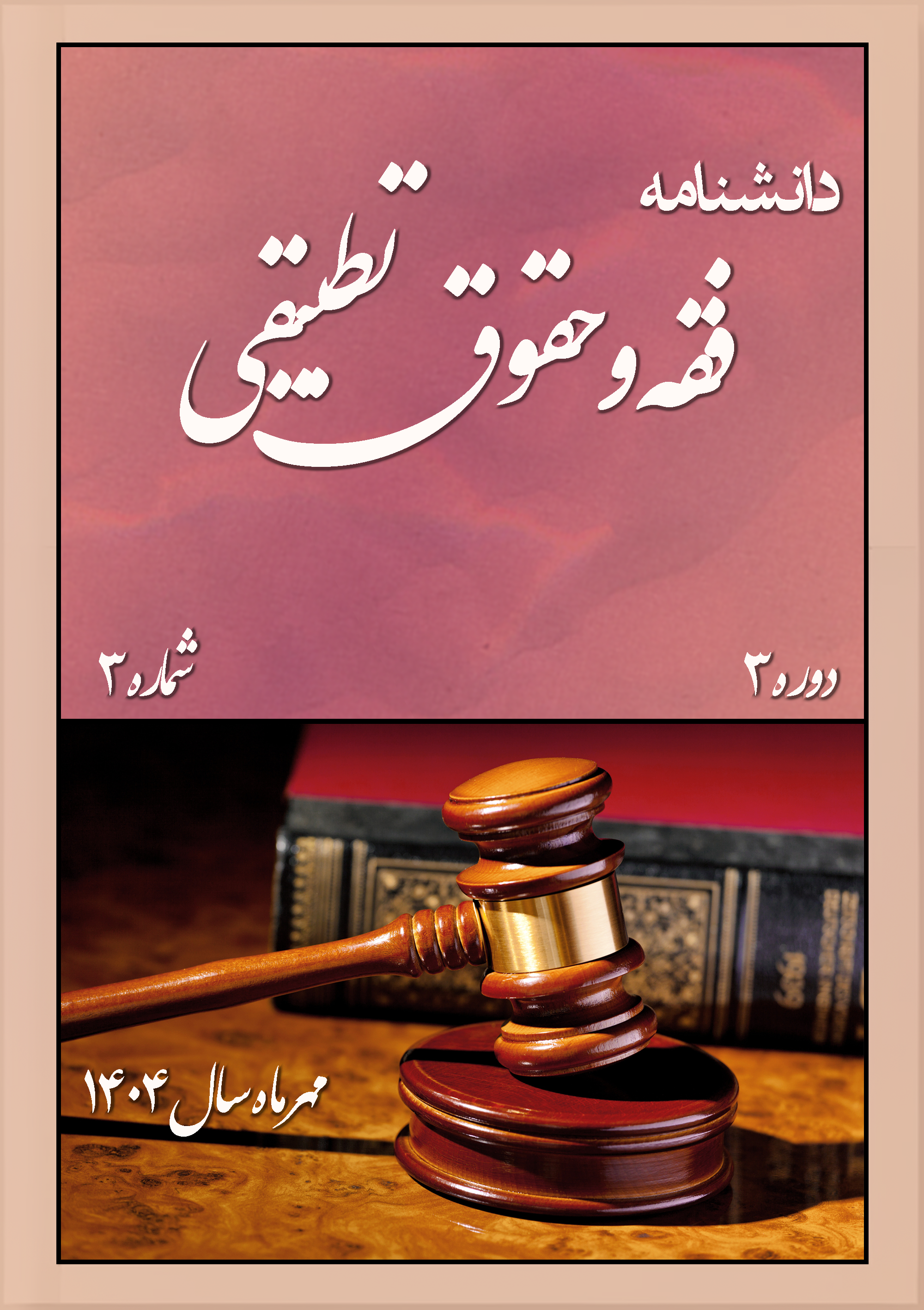Investigating the Role of Adverse Childhood Experiences in the Commission of Homicide (Case Study: Juvenile Offenders at the Alborz Province Juvenile Correction and Rehabilitation Center)
Keywords:
Adverse childhood experiences, adolescents, murder, offenderAbstract
The aim of this study is to explain and identify the relationship between adverse childhood experiences and the commission of homicide during adolescence in Alborz Province. By understanding the trajectory through which adolescents are driven toward criminal behavior as a result of adverse experiences, the research provides a clearer perspective for planning and policy-making by relevant institutions in the field of child and adolescent welfare. This study employed a causal-comparative (ex post facto) research method. Out of a total of 449 respondents, 412 individuals (91.8%) were non-delinquent adolescents and 37 individuals (8.2%) were juvenile offenders. The mean and standard deviation of age in the delinquent group were 16.80 and 0.53 respectively, while in the non-delinquent group they were 16.65 and 0.46, with the age range in both groups spanning from 15 to 18 years. In some indices, the Childhood Trauma Questionnaire (CTQ) developed by Bernstein, Stein, Newcomb, Walker, Pogge, and colleagues (2003) was used to assess childhood trauma and adverse experiences. Statistical analysis was conducted using SPSS version 28 and the Mann-Whitney U test. Findings revealed that juvenile homicide offenders had significantly higher mean scores in childhood trauma and all of its components (p < .05). Furthermore, these adolescents had significantly higher scores in witnessing violence against their mothers, and in having a parental history of mental illness, divorce, addiction, or incarceration (p < .05). The research indicated that adverse childhood experiences (under the age of 15) play a significant role in the commission of homicide during adolescence (ages 15 to 18).
Downloads
References
Aliverdinia, A., & Younesi, E. (2014). The Effect of Self-Control on Crime Among University Students. Culture Strategy, 7(26), 93-118. https://sid.ir/paper/498954/en
Alizadeh, M. (2022). The Concept of Divine Love in Quranic Verses and the Narrations of Imam Sadegh (AS) and Its Connection to Attachment Theory in Psychology. Quranic Insight and Islamic Mysticism Quarterly, 2(4), 55-64.
Babaei, M. A. (2013). Criminal Activism. Tehran: Majd Publications.
Finch, K., Lawrence, D., Williams, M. O., Thompson, A., & Hartwright, C. (2024). Relationships between adverse childhood experiences, attachment, resilience, psychological distress and trauma among forensic mental health populations. The Journal of Forensic Psychiatry & Psychology, 35, 660-684. https://doi.org/10.1080/14789949.2024.2365149
Ford, J. D. (2005). Treatment Implications of Altered Affect Regulation and Information Processing Following Child Maltreatment. Psychiatric Annals, 35(5), 410-419. https://doi.org/10.3928/00485713-20050501-07
Gholami, H. (2008). Recidivism. Tehran: Mizan Publishing.
Haji-Tabar Firozjaei, H., Khoshbakht, N., & Mazbouhi, S. (2015). The Role of Family Violence Against Students in Their Delinquency. Family and Research Quarterly, 11(4), 23-36.
Hashemlou, J. (2023). Dorothy Law Nolte's Theory of Family Emotional Climate. Blog Post. https://jafarhashemlou.blogfa.com/post/3338
Jones, M. S., & Pierce, H. (2020). Early Exposure to Adverse Childhood Experiences and Youth Delinquent Behavior in Fragile Families. Youth & Society, 7(53), 1-27. https://doi.org/10.1177/0044118X20908759
Manchester University. (2017). Adverse Childhood Experiences (ACEs) and Attachment. https://mft.nhs.uk/rmch/services/camhs/young-people/adverse-childhood-experiences-aces-and-attachment/
Manool Yan, A. C., & Azadiketa, M. (2022). The Relationship Between Adverse Childhood Experiences and Depression: The Mediating Role of Mindfulness. Psychological Methods and Models Journal, 13(50), 110-118.
Masoumi, M., & Arghavani Pir-Salami, M. (2017). The Impact of Parental Imprisonment on the Deviance and Social Future of Their Children Among Prisoners in Fars Province (2010-2015). National Conference on Modern Research in Management, Economics, and Humanities,
Mostafapour, M., & Hosseini, S. M. (2017). "Neurocriminology": A Novel Approach to Analyzing Violent Crimes Among Children and Adolescents (With Emphasis on the Age-Crime Curve). Criminal Law Research Quarterly, 5(19), 127-196.
Murray, J., & Farrington, D. P. (2008). The Effects of Parental Imprisonment on Children. Crime and Justice, 37(1), 133-206. https://doi.org/10.1086/520070
Narayan, A. J., Lieberman, A. F., & Masten, A. S. (2021). Intergenerational Transmission and Prevention of Adverse Childhood Experiences (ACEs). Clinical psychology review, 85, 1-11. https://doi.org/10.1016/j.cpr.2021.101997
Shirbigi Pour-Hematabad, M. (2014). Investigating the Causes of Juvenile Delinquency in Rafsanjan County Islamic Azad University, Sirjan Branch, Faculty of Law, Theology, and Political Science, Department of Law].
Siegel, L. J. (2012). Criminology. Wadsworth Cengage Learning.
Steketee, M., Aussems, C., & Haen Marshall, I. (2021). Exploring the Impact of Child Maltreatment and Interparental Violence on Violent Delinquency in an International Sample. Journal of interpersonal violence, 36(4), 1-31. https://doi.org/10.1177/0886260518823291
Suri, H., Amraei, K., Naseri Nia, G., & Moradnezhad, A. (2020). The Mediating Role of Family Emotional Climate in the Relationship Between Resilience and Happiness Among Students. Family and Research Quarterly, 17(2).
Wang, L.-X., Li, J.-B., Liu, Z.-H., Zeng, J., & Dou, K. (2025). The Impact of Adverse Childhood Experiences on the Development of Adolescent Risk-Taking: The Mediating Effect of Self-Control and Moderating Effect of Genetic Variations. Journal of youth and adolescence, 54, 1356-1376. https://doi.org/10.1007/s10964-025-02136-5
Downloads
Published
Submitted
Revised
Accepted
Issue
Section
License
Copyright (c) 2025 مهدی وحدت طاهر, حسنعلی موذن زادگان, حسین غلامی دون, فرامرز سهرابی اسمرود (نویسنده)

This work is licensed under a Creative Commons Attribution-NonCommercial 4.0 International License.










